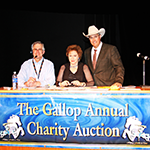In part 1 of this series, we discussed the importance of pedigree, movement, and temperament when choosing a potential stallion to promote.
Moving on to part 2, we continue the discussion by exploring the importance of conformation, market potential, financial commitment, and the “wow factor” when determining an appropriate candidate to remain a breeding stallion.
Debbi Trubee of North Farm, Kim Dean of The Breeding Barn, Ken Masterson of Masterson Farms, LLC, and Amy Gumz of Gumz Farms have all essentially written the book on choosing successful stallions to market.
Conformation
How is your colt put together?
Trubee says conformation is her number one consideration – “If they are made right, they will move right. Their neck has to come out in the proper position, their hocks must be low, their hip must be big, their shoulder must have the right slope, and their back must be short.”
A horse will often pass on its defects, however, Trubee admits, “There are exceptions to the rule, and a horse with poor conformation may win, but they aren’t worth breeding to because the chances of getting a good, sound mover out of poor conformation are minimal.” Simply put, “Just because they’re great-minded and do their job, that doesn’t make them a stallion candidate. He has to be built correctly. Otherwise, he would make the perfect gelding.”
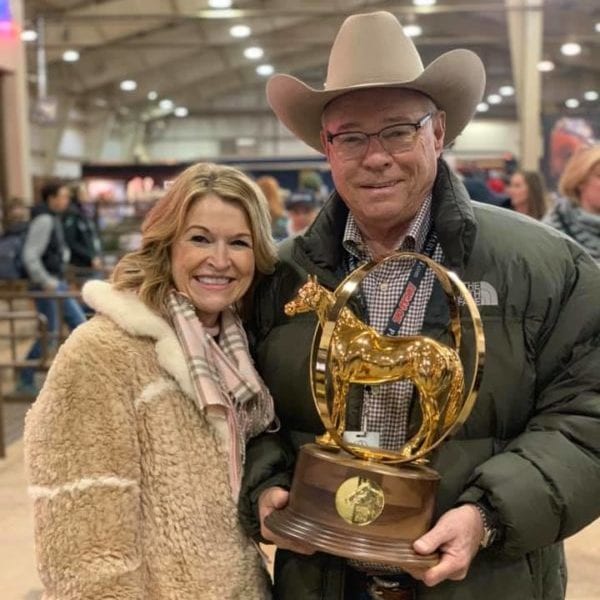 Masterson looks for a prospect that has “ideal conformation,” with emphasis on qualities such as “good bone, a gorgeous head with a tight throat latch, and well-shaped neck that ties in correctly.”
Masterson looks for a prospect that has “ideal conformation,” with emphasis on qualities such as “good bone, a gorgeous head with a tight throat latch, and well-shaped neck that ties in correctly.”
Gumz is a firm believer that, “Any successful horse needs to have form to function. They need to be visually appealing, but we also have to see the structure that will yield the movement that we all desire. There is no perfect horse, but key conformational faults need to be avoided in any breeding animal.”
Market
What is the market demand for a colt like this?
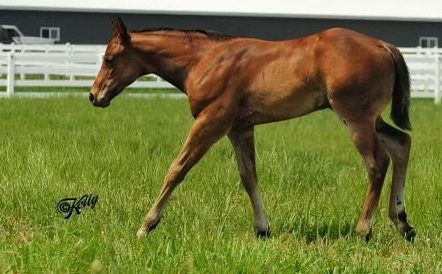 According to Trubee, “If the horse has superior genetics and is a great show horse, there will always be a market for that.” She believes it typically becomes clear once a horse starts showing whether people are interested in him as a breeding animal. “The cream always rises to the top,” Trubee reminds us. “Shows are a great gauge of whether a stallion will be able to attract a good group of mares. However, show success alone does not a stallion make.” For example, Invitation Only’s highest overall placing as a show horse was third. Trubee says, “It takes time to determine, but the best indicator of whether there is a market for a stallion is his get – which takes years to establish.”
According to Trubee, “If the horse has superior genetics and is a great show horse, there will always be a market for that.” She believes it typically becomes clear once a horse starts showing whether people are interested in him as a breeding animal. “The cream always rises to the top,” Trubee reminds us. “Shows are a great gauge of whether a stallion will be able to attract a good group of mares. However, show success alone does not a stallion make.” For example, Invitation Only’s highest overall placing as a show horse was third. Trubee says, “It takes time to determine, but the best indicator of whether there is a market for a stallion is his get – which takes years to establish.”
 A Good Machine was the first stallion that Dean personally owned. She says that the market is fickle, and it is very tough to establish yourself, especially when it is your first foray into the stallion industry. “You have to have big shoulders and a short memory when people tell you they don’t want to breed to your stud.” You can have the most quality animal in the world, but if the market doesn’t support him, you’re left treading water and spending lots of money without much return.
A Good Machine was the first stallion that Dean personally owned. She says that the market is fickle, and it is very tough to establish yourself, especially when it is your first foray into the stallion industry. “You have to have big shoulders and a short memory when people tell you they don’t want to breed to your stud.” You can have the most quality animal in the world, but if the market doesn’t support him, you’re left treading water and spending lots of money without much return.
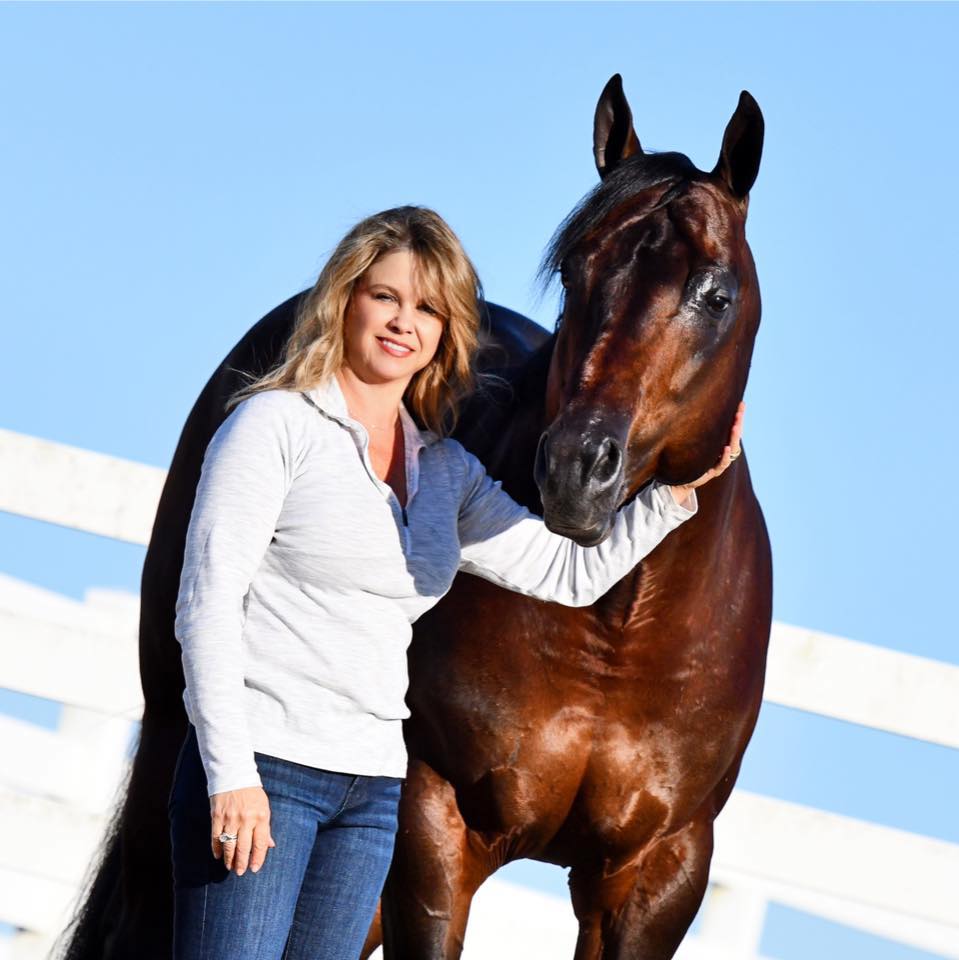 Gumz warns that it can be easy to fall in love with a foal when you researched the stallion, invested in the breeding, love the mare, and have a good-looking colt on the ground. She cautions that, “So many people get barn blinded by color or size or an emotional attachment, and aren’t really critical of pedigree, conformation, movement, etc.”
Gumz warns that it can be easy to fall in love with a foal when you researched the stallion, invested in the breeding, love the mare, and have a good-looking colt on the ground. She cautions that, “So many people get barn blinded by color or size or an emotional attachment, and aren’t really critical of pedigree, conformation, movement, etc.”
She says she “cannot emphasize enough to be critical, brutally so, of the colt and the mare. You have to be sure that you really want a seat on the roller coaster ride of breeding stallions.” The market will not just fall in love with a stallion because you bred him, he has to bring something unique to the table, or he will be cast aside in favor of something better.
Financial Commitment
Are you prepared to invest in the training, showing, and marketing of this particular colt?
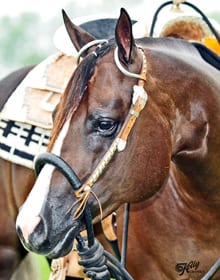 According to Trubee, “It costs hundreds of thousands of dollars to get a stallion into the breeding shed, and then it takes years to determine whether they will sire quality offspring. The actual percentage of stallions that really make it is minuscule.”
According to Trubee, “It costs hundreds of thousands of dollars to get a stallion into the breeding shed, and then it takes years to determine whether they will sire quality offspring. The actual percentage of stallions that really make it is minuscule.”
For those looking to breed for world-level caliber foals, it’s a huge investment that may never offer a return, whereas the same horse as a show gelding may be worth a lot of money. Trubee reminds breeders that, “Stallions require special handling, special turnout, and more logistics go into their management and care.” Overall, they are more expensive to manage, keep, and promote effectively than any other equine investment.
Masterson agrees with Trubee, saying, quite simply, standing and marketing a stallion costs “a lot!” Indeed, “Beyond the usual expense of training and competing in all the major shows, you must be willing to invest in a heavy advertising and promotion campaign. Over a couple of years, you could obviously be talking about an investment of six figures.”
 Dean says, “When you add the cost of purchasing the stud, or even just getting him on the ground, and then add training, shoeing, vet expenses, hauling, entry fees, advertising, etc. and then weigh the risk, it’s certainly not for the faint of heart.”
Dean says, “When you add the cost of purchasing the stud, or even just getting him on the ground, and then add training, shoeing, vet expenses, hauling, entry fees, advertising, etc. and then weigh the risk, it’s certainly not for the faint of heart.”
More goes into standing a stallion than just meeting the threshold considerations discussed in this article. Dean warns, “If you are lucky enough to end up with a stud with popular bloodlines and a great dam that has a great 2 and 3-year-old show season and you decide you want to breed him, you’ll continue to have to pay for board, shoeing, vet bills, charges from the breeding farm for standing him, advertising, and paying him up into breeding incentives.”
 In short, in Dean’s experience, “It takes at least five years before you can start to see a return on your investment…and that’s if he demonstrates he can consistently sire quality foals.”
In short, in Dean’s experience, “It takes at least five years before you can start to see a return on your investment…and that’s if he demonstrates he can consistently sire quality foals.”
Gumz agrees, reminding us, “The financial investment is huge, but so is the emotional investment. It’s a tough business, and you need a thick skin as the horse breeding industry is not for the faint of heart. It’s often a fickle business, and all the pieces can be there and still not have a marketable and successful stallion. So you have to be mentally, physically, and financially ready for the ride.”
All of our experts agree, if you’re not able to invest the time and money in the proper management and promotion of a stallion, you are better off selling or gelding the animal.
Wow Factor
What makes your colt stand out from the sea of other stallion candidates?
 All of our experts mentioned that the top stallions had a certain je ne sais quoi about them, even at a young age, that set them apart from the crowd.
All of our experts mentioned that the top stallions had a certain je ne sais quoi about them, even at a young age, that set them apart from the crowd.
Gumz’s general policy is to geld all colts. However, some of them have “a wow factor that is hard to put into words. Every successful stallion that I have had a role in, from birth had this ‘wow factor.’ I have described it as when the colt stands up, heaven’s lights shine down on him and tells us that he is the one.”
Masterson adds, “There’s no question a ‘wow factor’ is a real prerequisite for a successful breeding horse. So, obviously, while you want to be excited about your prospect, what you really want to hear is a huge buzz about him and, hopefully you hear it from the very beginning of his exposure to the public.”
A Good Machine was sent to John Dean for training in April of this two-year-old year. Kim vividly remembers John calling her to come out of the office to sit on the fence and watch him just a few days after he arrived. John hadn’t told her anything about the colt at that point, but “when he cracked him off at the lope, I was stunned and excited. After that, there was never any doubt in my mind that A Good Machine could be a great one. He absolutely had the ‘wow factor.’”
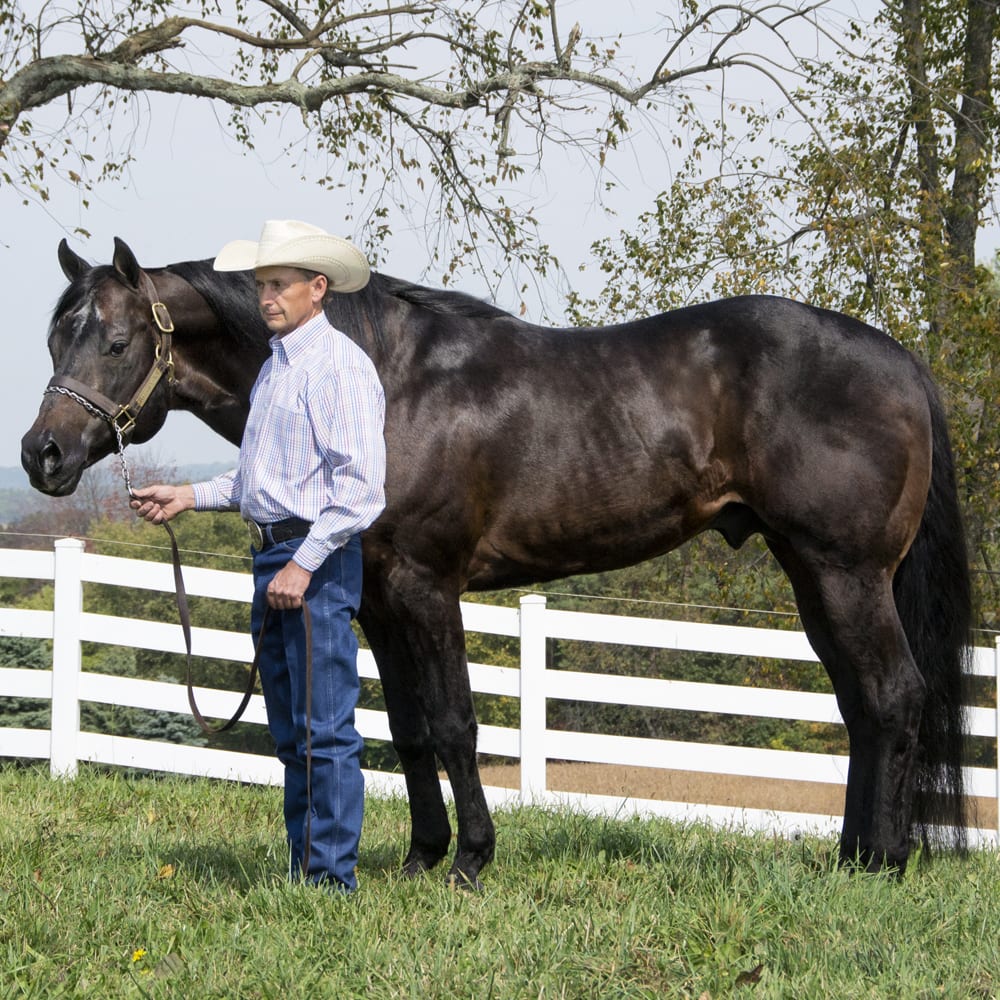 Trubee has raised many horses and has only kept two of the foals she’s personally raised intact. She admits that, because so many quality horses have come through her facility, it takes a lot for a horse to wow her. However, a legitimate stallion candidate should stand out from the crowd, even at a young age. There needs to be something about him that is exceptional.
Trubee has raised many horses and has only kept two of the foals she’s personally raised intact. She admits that, because so many quality horses have come through her facility, it takes a lot for a horse to wow her. However, a legitimate stallion candidate should stand out from the crowd, even at a young age. There needs to be something about him that is exceptional.
Trubee reminisces, “I never had a moment where I looked at Invitation Only, and he didn’t take my breath away – from his eye to his tail set, he was perfection.” Trubee says the horse breeding industry is highly competitive and if the stallion doesn’t give you “goosebumps” when you see them going, he probably won’t make a breeding stallion.
***
In short, if you don’t know what discipline your colt will succeed at, what unique traits he has to offer the industry, whether there is a demand for an animal like him, or whether you are in a financial position to invest in his long-term success, it is best to geld. After all, “a decent stallion prospect makes for a wonderful gelding.”
In case you missed it, click here to read part one of this 2-part series, where our experts discussed the importance of pedigree, movement, and temperament when choosing a stallion candidate.




